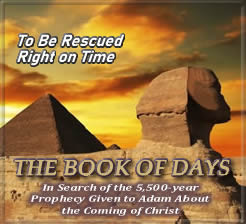Misconception #35 (Cont’d)
The Call of Christ Comes Unexpectedly and Unannounced
Prior to Christ’s call of Matthew, we read that news began to circulate about what Jesus was doing in the cities around Galilee, where His deeds of healing had become so famous He could no longer enter any city without great fanfare.1 When Jesus decided to visit Capernaum, the crowds surrounding Him were so dense there was hardly room enough to stand.
Meanwhile, four men brought their friend who was sick with the palsy, hoping Jesus would heal him, too. But because the room was so crowded, the men had to break a hole in the roof in order to lower their bedridden friend into the presence of Jesus, Who was so impressed with their faith He immediately healed the man. Stunned, everyone watched as the man got up under his own strength, picked up his bed, and walked out of the room, as if he’d never been sick at all.
From there, Jesus went to the seaside, teaching the crowds along the way. This was when He spotted Matthew doing his job of tax collecting, and when He invited him to drop everything he was doing to follow Him.2
The reason I mention all this is to set the scene in which this call of Christ took place. If you notice, it didn’t occur, as tradition is so fond of portraying, in a vacuum, as if Matthew had been ignorant of Jesus’ reputation as a powerful healer, and as if he’d never heard any of His teachings. If that had been the case, then, yes, dropping everything to follow Jesus could be perceived as a daring and heroic move by someone who was making a decent living just sitting around collecting taxes. But that’s not what the context of Mark’s Gospel presents to us.
Story Continues Below
Says Richard Price—the founder and CEO of Academia.edu—on his podcast In Depth With Academia:
Fish Tales (From the Belly of the Whale): Fifty of the Greatest Misconceptions Ever Blamed on The Bible is:
To hear Price’s book review of Fish Tales (From the Belly of the Whale), CLICK HERE.
To hear Kent and Zen Garcia talk about correcting biblical misconceptions, from June 23rd, 2021, CLICK BELOW.
Story Continues From Above
According to it, Matthew knew exactly what Jesus was doing and teaching, so that when he was invited to follow Him, he chose to do so with an acute awareness of Who he was getting involved with. This isn’t to say that Matthew had any idea as to the repercussions of following Jesus, as this is something for which none of us are ever prepared. But it does demonstrate he wasn’t acting impulsively, as tradition would have us believe.
What’s more, Mark continued with this idea in the next chapter when he described how tremendous crowds would gather about Jesus, having heard about the incredible things He’d been doing. And because so many sick people were being healed simply by touching Him, the crowd would press into Him, forcing Jesus to teach the multitudes from a small ship docked at the seashore.
Mark even recorded that whenever a person possessed by a demon would pass by, they’d fall at His feet, acknowledging that He was the Son of God. It was within this unique context, then, that Mark said Jesus called His twelve disciples. Again, the picture that Mark is creating for us is one in which Jesus was calling people who were all fully aware of the astounding nature of the One Who was calling them, and not of people who were ignorant of the circumstances that surrounded Him.
In short, everyone who Jesus invites to follow Him knows exactly Who they’re being asked to follow, and why.
This same idea was confirmed by Jesus in His famous discourse about the Good Shepherd. The sheep don’t ignorantly follow the shepherd; they do so because they know His voice, whereas others they won’t follow because they don’t recognize the voice of a stranger.3 Said Jesus:
I am the Good Shepherd. I know My sheep, and they recognize Me. My sheep hear My voice; I know them, and they follow Me.4
So you see, if we’re to believe Jesus, then it should be obvious that whenever He calls someone into a relationship with Him, He does so with their complete understanding. He doesn’t blindside them or catch them unprepared. He’s taught them, He’s touched their heart, their soul, and, if need be, their body, and now He’s laying claim to the reins of their life. After everything He’s done to that point, He’s now challenging them to acknowledge that it’s been His voice that they’ve been hearing all along.
To believe otherwise would be to ignore what the entire context of Scripture presents, even as the psalmist wrote centuries before the Advent of Christ: “You’ve possessed my reins, having covered me in my mother’s womb.”5
So, considering all this scriptural evidence, why would anyone believe that the call of Christ would come to someone, as if that person had unwittingly stumbled into some kind of cosmic surprise party?
Well, let’s see; how about because centuries of church tradition have led us to believe in such melodramatic nonsense? After a lifetime of having been bombarded with verses that are constantly being quoted out of context, it’s no wonder that most people misinterpret what The Bible has to say on this subject. And remember, one only needs to extract a few verses to create a truly effective disinformation strategy.








